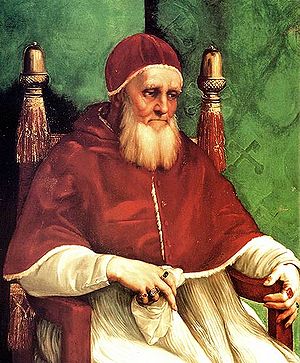Julius Ii
 From Conservapedia
From Conservapedia Pope Julius II (1443-1513), Pope of The Catholic Church, 1503-1513. A warrior pope, he enlarged the Papal States. He legislated against simony and duelling, and sent missionaries to Ethiopia, America, the Congo, and India. A leading patron of the arts in The Renaissance, he laid the cornerstone of St. Peter's Basilica, and was the patron of Bramante, Raphael, and Michelangelo. Julius II was seen as a dissolute, hyper-aggressive egomaniac by Erasmus, Machiavelli and other contemporaries

Career[edit]
He was born Giuliana della Rovere at Albissola near Savona, Italy, on Dec. 5, 1443. His family was poor but had noble status. He followed his uncle Francesco della Rovere into the Franciscan Order. When his uncle was elected pope Sixtus IV, he was made cardinal in 1471. Nepotism from the pope allowed him to acquire a dozen more episcopal sees (some of them simultaneously) and other benefices, the revenues of which he devoted to sponsoring artists, and building palaces and fortresses. A successful diplomat, he was twice papal legate to France. He used bribes to fix the election of Cardinal Cibo as Pope Innocent VIII. He opposed the election of Rodrigo Borgia as Alexander VI, during most of whose reign he stayed in France, and after the very short pontificate of Pius III, he attained his ambition and was elected pope on October 31, 1503.
Warrior Pope[edit]
The fame of Julius II as a warrior pope rests largely on his reestablishment and extension of the Papal States. He was personally not a great soldier but he owed most of his victories to French armies or finally, in 1512, to Spanish and Swiss armies.
After recovering cities held by Venice, he seized others with the help of France and the Holy Roman Empire. Then, wishing to free all Italy from foreign power, he made new alliances and placed France under interdict. French countermeasures culminated in the schismatic council at Pisa in 1511. Julius formed the Holy League with Ferdinand of Aragon and Venice, which was joined by King Henry VIII of England and the emperor. In 1512 the Holy League drove the French from Italy. During the Fifth Lateran Council, called in 1512 to deal with France, the ecclesiastical reform, and the war against the Turks,
Further reading[edit]
- Ott, Michael. "Pope Julius II." The Catholic Encyclopedia. Vol. 8. 1910. online edition
- Shaw, Christine. Julius II: The Warrior Pope (1997) excerpt and text search
Categories: [Popes] [Renaissance]
↧ Download as ZWI file | Last modified: 02/16/2023 18:44:52 | 23 views
☰ Source: https://www.conservapedia.com/Julius_II | License: CC BY-SA 3.0
 ZWI signed:
ZWI signed: KSF
KSF